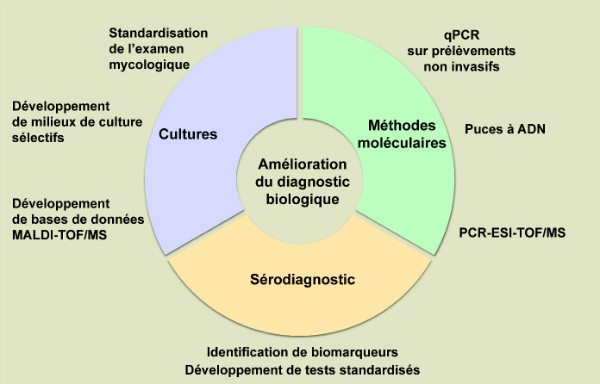- Index
- >Research topics
- >Axis 1 : Clinical-biological monitoring
- >Theme 3: Improved biological diagnosis
Improved biological diagnosis
Two national or international studies have been carried out in recent years. The results of these studies, currently being analyzed, should enable us to propose recommendations for the mycological examination of sputum from cystic fibrosis patients.
Nevertheless, given the recent emergence of new fungal species in this clinical context, it remains necessary to develop new selective culture media and evaluate their performance in multicenter studies on a national or international scale, which will certainly lead to a revision of the initial recommendations in this field.
At the same time, reliable, standardized serological tests are being developed in the laboratory to differentiate between colonization and sensitization/infection, involving the identification of diagnostic markers, the production of recombinant proteins and the evaluation of their value for serodiagnosis. In this field, we have recently produced three recombinant proteins for the S. apisopermum complex and demonstrated the value of combining two of these recombinant proteins for the specific detection of serum antibodies to species of the S. apiospermum complex, and similar work will be carried out on other fungal pathogens associated with cystic fibrosis.
Finally, molecular techniques offer an interesting alternative to cultural techniques. Various methods have been proposed in recent years to detect the major pathogens encountered in cystic fibrosis, but these have yet to be validated in multicenter studies. Similarly, methods enabling both detection and direct identification of all fungal species that may colonize the respiratory tract need to be developed.
We will also evaluate:
i) a qPCR on the mtLSUrRNA gene for the diagnosis of P. jirovecii infections from minimally invasive samples (oropharyngeal wash) to differentiate Pneumocystis pneumonia from colonization,
ii) a serum ß(1,3)-D glucan assay technique for the diagnosis of P. jirovecii infections, as part of the PneumoQuant PHRC.
.



